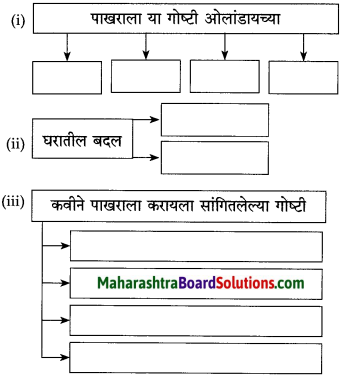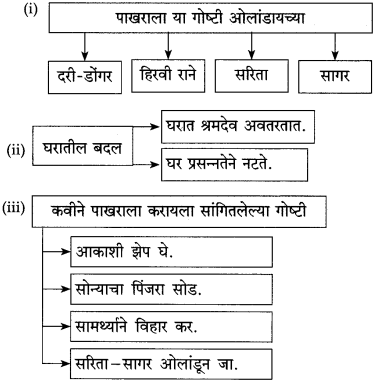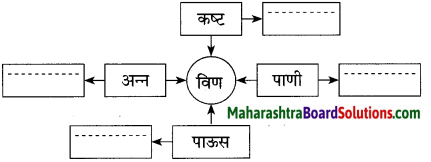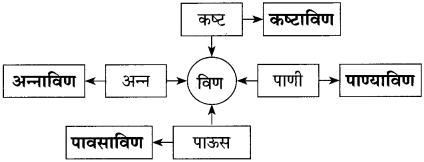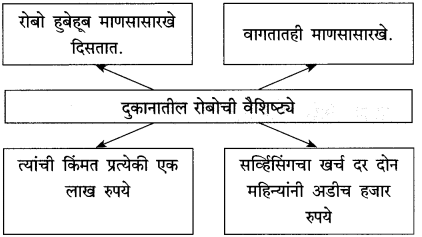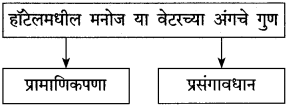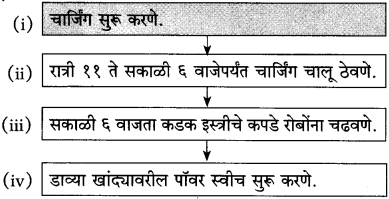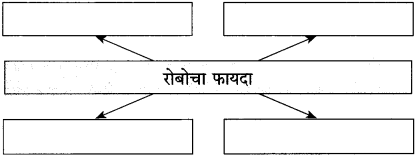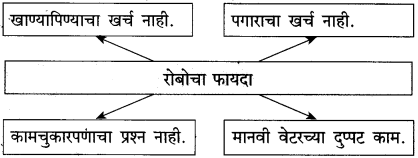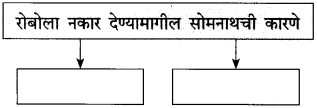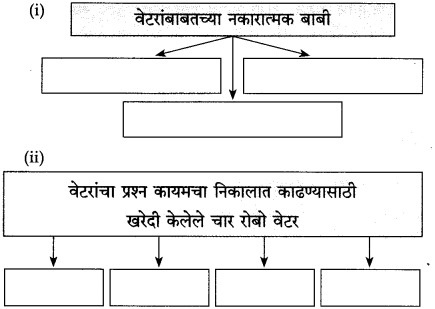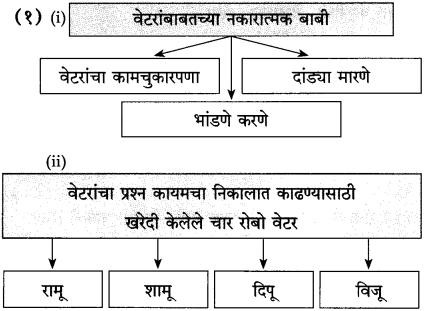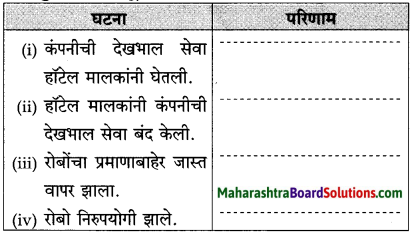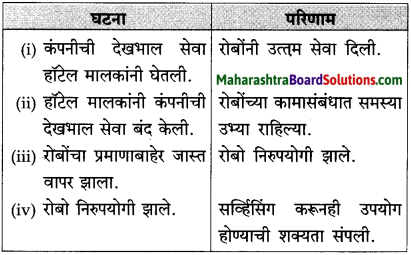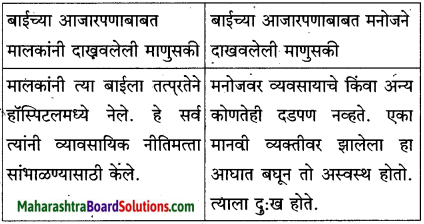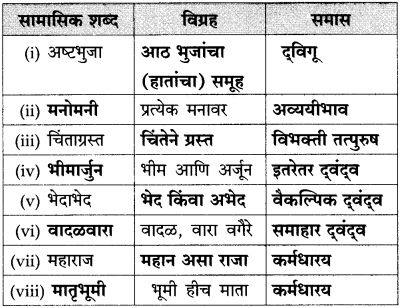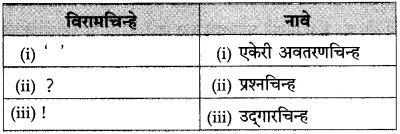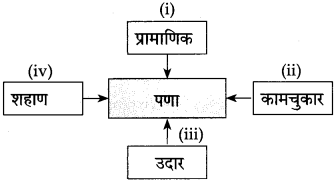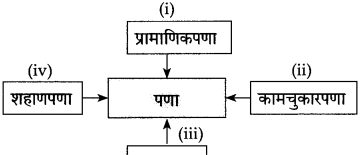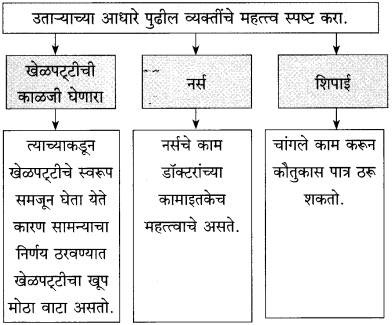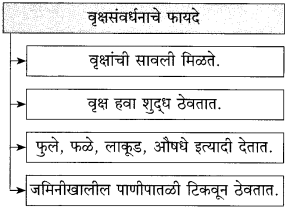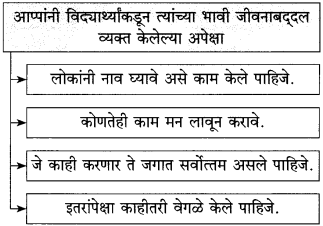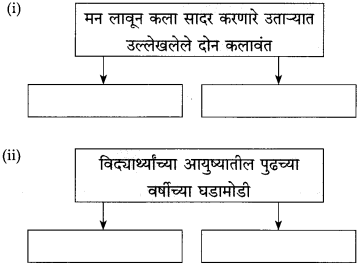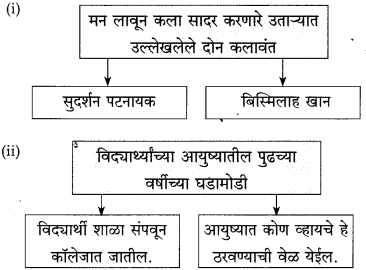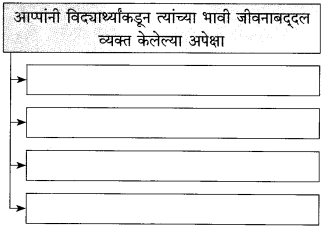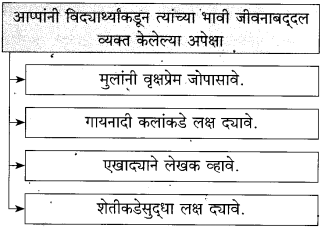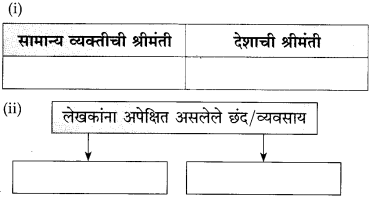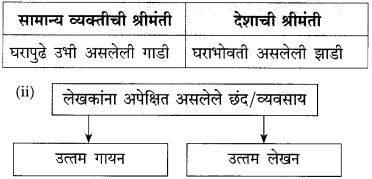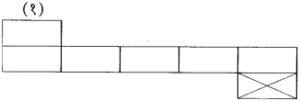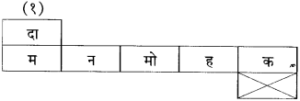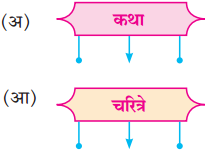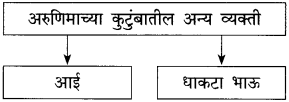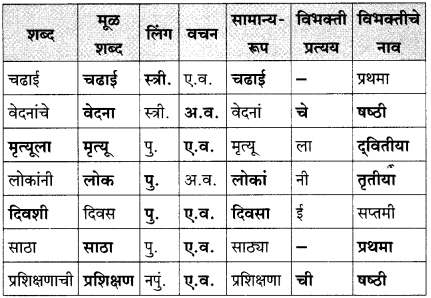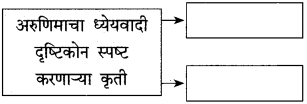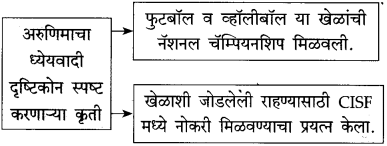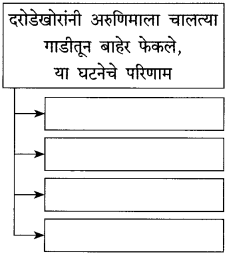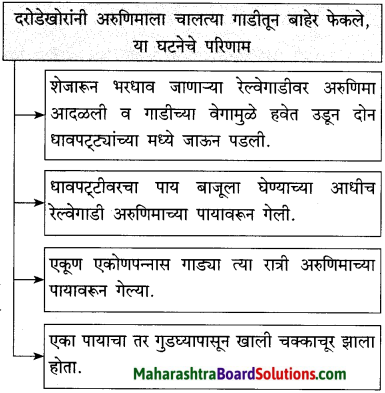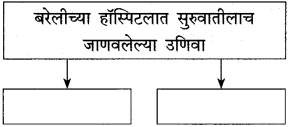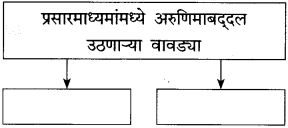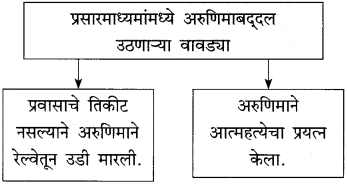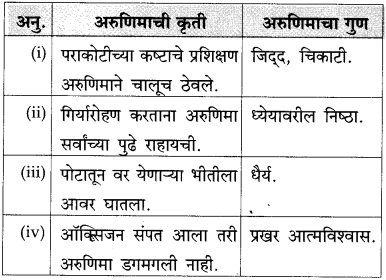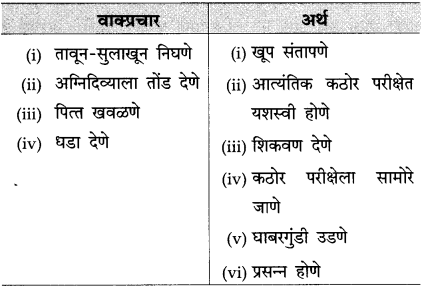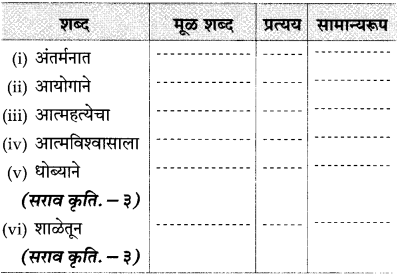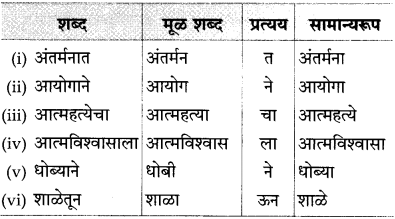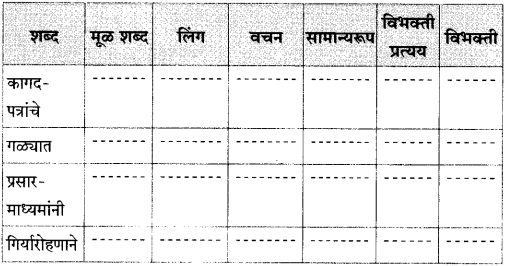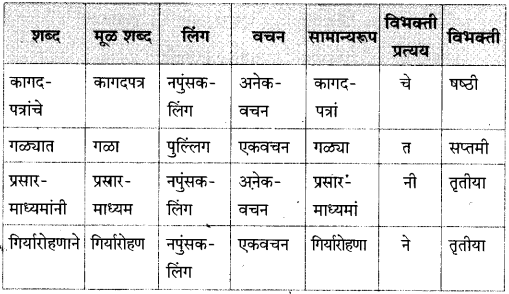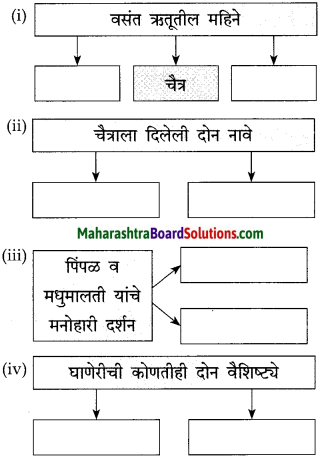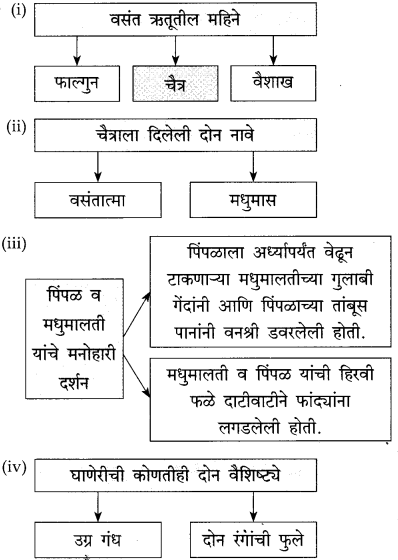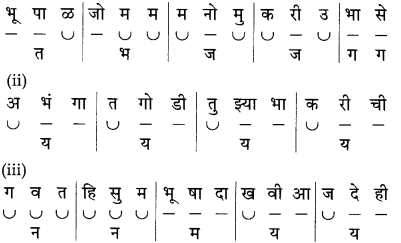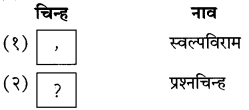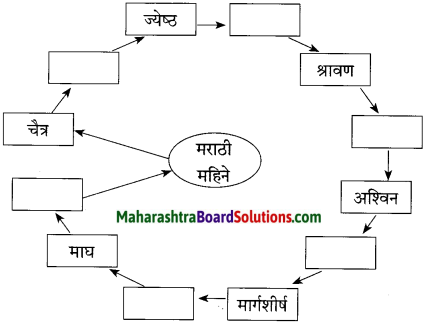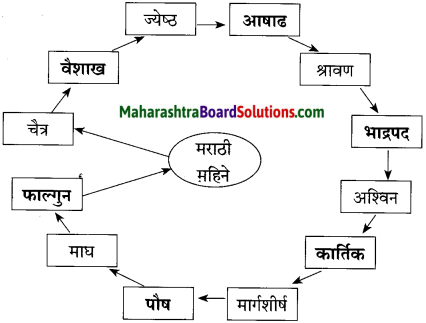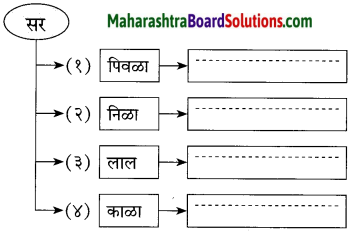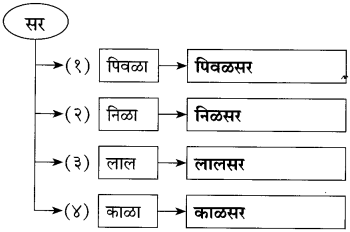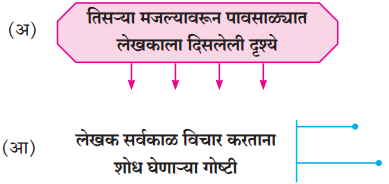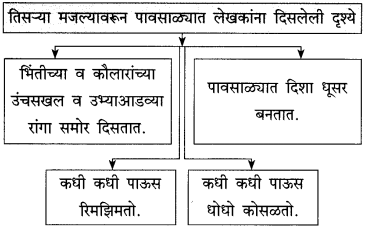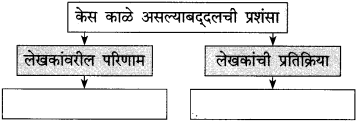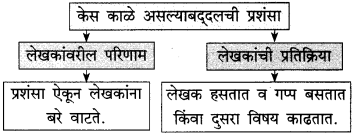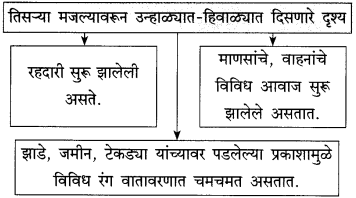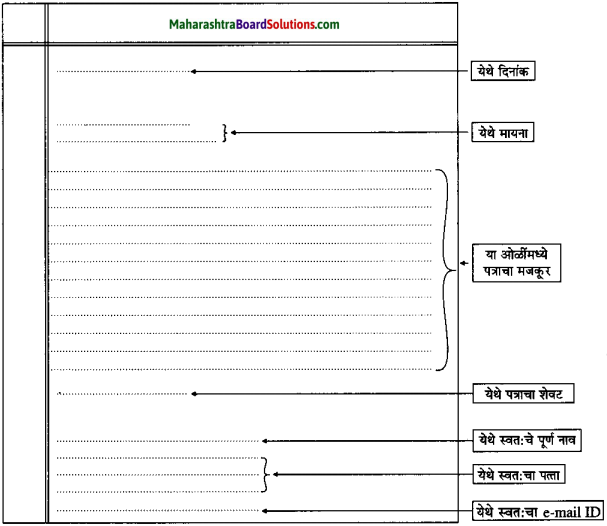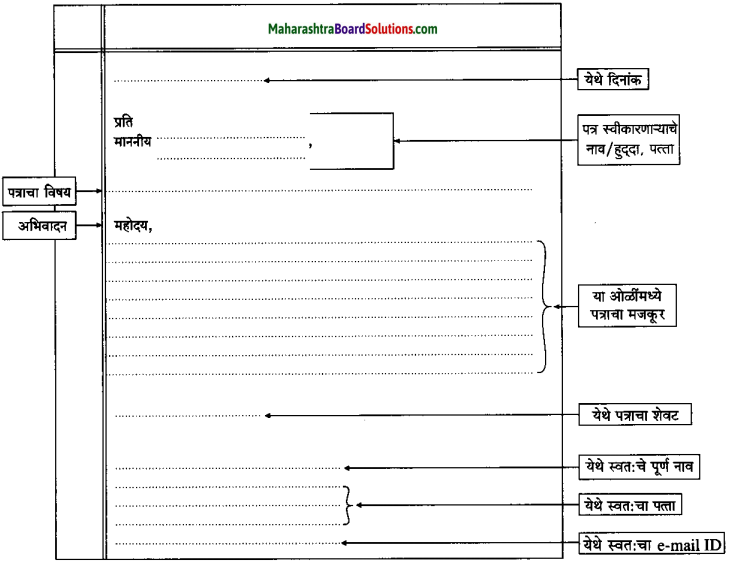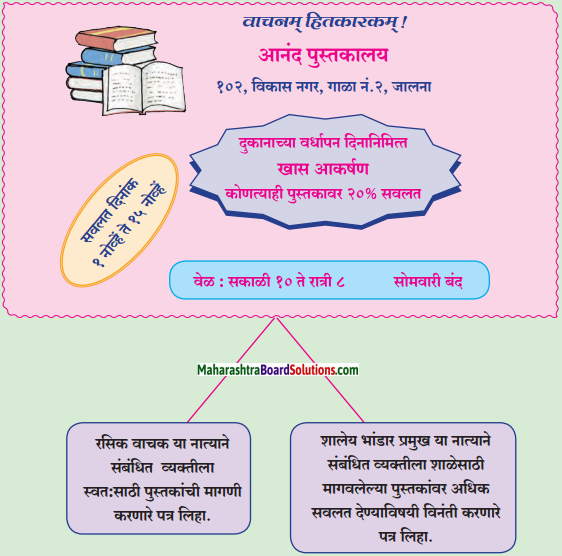Balbharti Maharashtra State Board Class 10 Marathi Solutions Kumarbharti Chapter 3 आजी : कुटुंबाचं आगळ Notes, Textbook Exercise Important Questions and Answers.
Class 10th Marathi Kumarbharti Chapter 3 आजी : कुटुंबाचं आगळ Question Answer Maharashtra Board
Std 10 Marathi Chapter 3 Question Answer
Marathi Kumarbharti Std 10 Digest Chapter 3 आजी : कुटुंबाचं आगळ Textbook Questions and Answers
प्रश्न. पुढील उतारा वाचा आणि दिलेल्या सूचनांनुसार कृती करा :
कृती १ : (आकलन)
प्रश्न 1.
विधाने पूर्ण करा :
(i) स्वत:च्या कपाळावरचे गोंदण दिसू नये, म्हणून आजी —————
उत्तर :
स्वत:च्या कपाळावरचे गोंदण दिसू नये, म्हणून आजी कपाळावर बुक्का लावत असे.
(ii) वर्ष-दीड वर्षाने जन्मणाऱ्या वासरांमध्ये एकाआड एक खोंड नक्की असे, म्हणून —————–
उत्तर :
वर्ष-दीड वर्षाने जन्मणाऱ्या वासरांमध्ये एकाआड एक खोंड नक्की असे, म्हणून दावणीला कायम कपिलीचे बैल असत.
(iii) सुनांनी चहा करून पिऊ नये, म्हणून —————-
उत्तर :
सुनांनी चहा करून पिऊ नये, म्हणून ढाळजेतून सोप्यात येऊन आजी सक्त पहारा करायची.
![]()
प्रश्न 2.
पुढील मुद्द्यांच्या आधारे आजीचे शब्दचित्र रेखाटा :
(i) आजीचे दिसणे : ——————–
उत्तर :
आजीचे दिसणे : आजीला साडेपाच फूट उंची लाभली होती. तिचा वर्ण गोरा होता. उन्हापावसामुळे तिची त्वचा काळपटली होती. आजीच्या वयाची माणसे कमरेत वाकतात. त्यामुळे चालताना काठी घ्यावी लागते. पण आजी अजूनही ताठ कण्याने चालत होती. अजूनही तिचे सगळे दात शाबूत होते. डोक्यावरचे सगळे केस पिकले होते.
(ii) आजीची शिस्त : ——————–
उत्तर :
आजीची शिस्त : आजीची शिस्त कडक होती. सगळ्यांना सगळी कामे करता आली पाहिजेत, असा तिचा कटाक्ष होता. तिने कामांची वाटणी केली होती. ती कामे आजी सर्व सुनांना आलटूनपालटून करायला लावी. दुपारच्या कामांचेही तिने नियोजन केलेले असे. सुनांनी मुलांच्या बाबतीत आपपरभाव करू नये म्हणून मुलांना खाऊपिऊ घालताना आजीचा सक्त पहारा असे. गल्लीतल्या बायका दुपारी गप्पागोष्टींना येत असत. त्या वेळी ती बायकांनी सांगितलेल्या गोष्टींची शहानिशा करीत असे.
(iii) आजीचे सौंदर्य : —————-
उत्तर :
आजीचे सौंदर्य : आजीचे वय आता सत्तर वर्षांचे होते. उन्हापावसामुळे आजीची त्वचा रापली होती. पण तिचा मूळ गोरा वर्ण लपत नव्हता. तिचे दात मोत्यांसारखे चमकत होते. विशाल कान व धारदार नाक यांनी आजीच्या सौंदर्यात भर पडत होती. चेहऱ्यावर सुरकुत्या पडल्या तरी तिच्या सौंदर्यात उणेपणा आला नव्हता.
(iv) आजीचे राहणीमान : ————-
उत्तर :
आजीचे राहणीमान : त्या काळात इरकली लुगडे उच्च राहणीमानाचे लक्षण होते. हिरव्या व लाल रंगांची नऊवारी इरकली लुगडी व अंगात चोळी हा तिचा पेहराव असे. कपाळावरचं गोंदण दिसू नये म्हणून त्यावर ती बुक्का लावी. ती नेहमी नाली ठोकलेल्या जुन्या वळणाच्या वहाणा वापरत असे.
प्रश्न 3.
चूक की बरोबर सांगा :
(i) राहिलेली अर्धी चरवी घरात आली, की म्हातारी ढाळजंतनं सोप्यात. अवतरायची.
उत्तर :
बरोबर
(ii) आजीच्या डोक्यावरील सर्व केस पांढरे होते……………….
उत्तर :
बरोबर
(iii) सुनांच्या कामाबाबत आजी फारशी काटेकोर नसायची.
उत्तर :
चूक.
कृती २ : (आकलन)
प्रश्न 1.
विधाने पूर्ण करा :
(i) मुलांनी भरपूर खावे-प्यावे व त्यांची आबाळ होऊ नये, म्हणून —————-
उत्तर :
मुलांनी भरपूर खावे-प्यावे व त्यांची आबाळ होऊ नये, म्हणून आजी त्यांना धपाटे घालून घालून खायला घाली.
(ii) प्रत्येक सुनेला प्रत्येक काम आलेच पाहिजे, असा आजीचा आग्रह होता, म्हणून ती ——–
उत्तर :
प्रत्येक सुनेला प्रत्येक काम आलेच पाहिजे, असा आजीचा, आग्रह होता, म्हणून ती रोटेशनप्रमाणे काम बदलत जाई.
(iii) मुलांना दूध प्यायला देण्याबाबत सुना आपपरभाव करतील, अशी भीती आजीला वाटे, म्हणून ————–
उत्तर :
मुलांना दूध प्यायला देण्याबाबतं सुना आपपरभाव करतील, अशी भीती आजीला वाटे, म्हणून ती मुलांना गोठ्यातच दूध प्यायला लावी.
![]()
प्रश्न 2.
पुढीलपैकी चुकीची वाक्ये दुरुस्त करून बरोबर वाक्ये व दुरुस्त केलेली वाक्ये पुन्हा लिहा :
(i) दुपारची कामे आटोपून आजी ढाळजेत यायची.
उत्तर :
दुपारच्या कामांचे नियोजन करून आजी ढाळजेत यायची.
(ii) गाईने पान्हा सोडला की वासराला सोडायचे.
उत्तर :
गाईने पान्हा सोडला की वासराला धरून ठेवायचे.
(iii) आजीच्या घरी एक गावरान गाय होती.
उत्तर :
आमच्या घरी एक गावरान गाय होती.
कृती ३ : (व्याकरण)
प्रश्न 1.
पुढील वाक्यांतील वाक्प्रचार शोधून अधोरेखित करा :
(i) आजीच्या छत्रछायेखाली आमचे सर्व कुटुंब गुण्यागोविंदाने नांदत होते.
उत्तर :
आजीच्या छत्रछायेखाली आमचे सर्व कुटुंब गुण्यागोविंदाने नांदत होते.
(ii) सत्तरीनंतरही आजीच्या हातात काठी आली नव्हती.
उत्तर :
सत्तरीनंतरही आजीच्या हातात काठी आली नव्हती.
प्रश्न 2.
पुढील अधोरेखित शब्दांच्या जाती ओळखा आणि त्यांचे उपप्रकार लिहा :
(i) चार घरच्या चार सुना नांदायला आल्या.
उत्तर :
चार : विशेषण. संख्यावाचक विशेषण.
सुना : नाम. सामान्य नाम.
आल्या : क्रियापद. अकर्मक क्रियापद.
(ii) प्रत्येकीला काम आलंच पाहिजे.
उत्तर :
काम : नाम. भाववाचक नाम.
(iii) आजीला एकाही सुनेचा भरवसा नव्हता.
उत्तर :
ही : शब्दयोगी अव्यय.
भरवसा : नाम. भाववाचक नाम.
(iv) आमच्या घरी एक गावरान गाय होती.
उत्तर :
एक : विशेषण. संख्यावाचक विशेषण.
गावरान : विशेषण. गुणवाचक विशेषण.
गाय : नाम. सामान्य नाम.
कृती ४ : (स्वमत / अभिव्यक्ती)
प्रश्न 1.
तुम्हांला आठवत असलेला किंवा तुमच्या आईबाबांनी सांगितलेला तुमच्या लहानपणचा एखादा प्रसंग लिहा.
उत्तर :
मी लहान होतो तेव्हा सकाळी उठलो की, दात घासून, तोंड धुऊन मी तडक रानातल्या आमच्या वाड्याकडे धावत सुटायचो. कोकणात गुरांच्या गोठ्याला वाडा म्हणतात. तेथे माझे आजोबा माझी वाटच बघत असत. दरदिवशी ते माझ्यासाठी एक तांब्याएवढे मडके भरून दूध गरम करून ठेवत. मी गेलो की, घटाघटा ते दूध पीत असे. त्यानंतर त्या मडक्याला चिकटलेली साय खरवडून खाणे हा माझा मोठा आनंदाचा भाग असे. माझ्या या अखंडित दिनक्रमामुळे कोणत्या गाई-म्हशीचे दूध कोणत्या चवीचे आहे, हे मी सहज ओळखू शकतो. दुधाला एक स्वत:चे माधुर्य असते. दूध पिताना लोक दुधात साखर का घालतात, हे मला अजून कळलेले नाही.
![]()
Marathi Kumarbharti Class 10 Textbook Solutions Chapter 3 आजी : कुटुंबाचं आगळ Additional Important Questions and Answers
प्रश्न. पुढील उतारा वाचा आणि दिलेल्या सूचनांनुसार कृती करा :
कृती १ : (आकलन)
प्रश्न 1.
एका शब्दात उत्तर लिहा : (मार्च १९)

उत्तर :

प्रश्न 2.
आकृती पूर्ण करा :
(i)
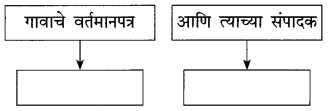
उत्तर :
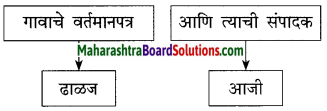
(ii)

उत्तर :
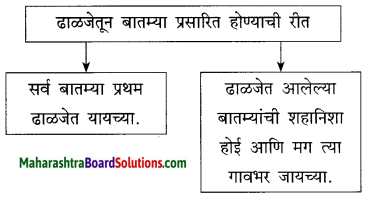
(iii)

उत्तर :
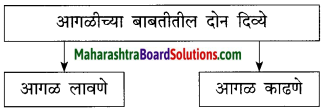
(iv)
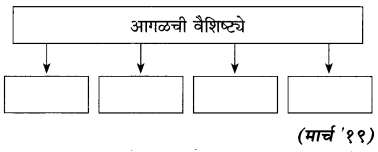
उत्तर :
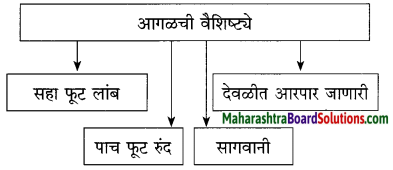
कृती २ : (आकलन)
प्रश्न 1.
दुपारच्या वेळी रूढ खेळांखेरीज मुले ज्या गमतीजमती करीत, त्या लिहा.
उत्तर :
- वडाच्या पारंब्यांना लटकत, लोंबत राहायचे आणि पारंब्यांच्या टोकाला फुटलेली पिवळी पालवी खात बसायचे.
- देवळातली घंटा वाजवाजवून झोपलेल्यांची झोपमोड करायची.
- विहिरीत मनसोक्त पोहायचे.
- शिवणापानी खेळायचे.
- हातपाय पोटाशी आवळून घेऊन शरीराचे मुटके करून विहिरीत धडादिशी उड्या घ्यायची.
- ओल्या अंगाने मातीत लोळायचे आणि पुन्हा पाण्यात इंबायचे आणि शेवटी थकून भागून घरी जायचे.
[टीप : परीक्षेत कोणतीही दोन किंवा चार नावे लिहायला सांगितली जाऊ शकतात.]
![]()
प्रश्न 2.
बालपणी लाभलेल्या रानमेव्यांची नावे सांगा. (कोणतीही चार नावे लिहा.)
उत्तर :
- गाभोळ्या चिंचा, मिठाचे खडे व कच्च्या कैऱ्या, बोरे, चिंचेची कोवळी पाने.
- उंबर, ढाळे, भाजलेली कणसे, हुरडा.
- कच्ची वांगी, गवार, टोमॅटो, शहाळे.
- कलिंगड, शिंगाडे (चिबूड), करडीची भाजी, ज्वारीचे कणीस.
- कवठ, तुरी-मटकीच्या शेंगा, उकडलेल्या शेंगा, कुळथाचे पिठले.
प्रश्न 3.
आकृत्या पूर्ण करा :
(i)

उत्तर :

(ii)
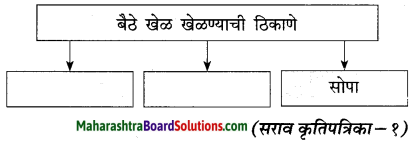
उत्तर :

(iii)
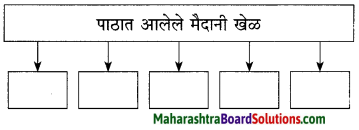
उत्तर :

प्रश्न 4.
पुढील घटना उताऱ्याच्या आधारे क्रमाने लिहा : (मार्च ‘१९)
(i) म्हातारीची ढाळज सुटायची
(ii) वाडा शांत व्हायचा
(iii) कडुसं पडायच्या आधी मैफिल मोडायची
(iv) माणसं ढाळजंत बसायची
उत्तर :
(iii) कडुसं पडायच्या आधी मैफिल मोडायची
(i) म्हातारीची ढाळज सुटायची
(iv) माणसं ढाळजंत बसायची
(ii) वाडा शांत व्हायचा
कृती ३ : (व्याकरण)
प्रश्न 1.
सहसंबंध लक्षात घेऊन उत्तरे लिहा :

उत्तर :

प्रश्न 2.
पुढील बोलीभाषेतील शब्दांना प्रचलित प्रमाण मराठी भाषेतील शब्द शोधून लिहा :
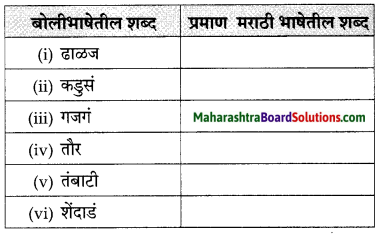
उत्तर :
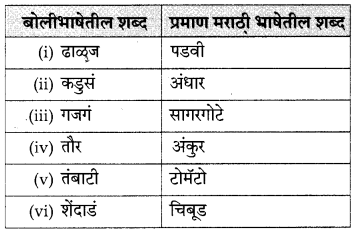
![]()
प्रश्न 3.
तक्ता पूर्ण करा :
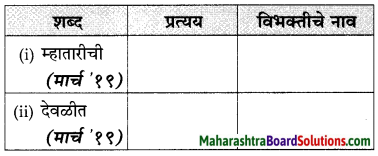
उत्तर :

प्रश्न 4.
पुढील वाक्यांतील अधोरेखित शब्दाचे लिंग बदलून वाक्य पुन्हा लिहा :
आजी त्याची संपादक होती. (सराव कृतिपत्रिका-१)
उत्तर :
आजोबा त्याचे संपादक होते.
कृती ४ : (स्वमत / अभिव्यक्ती)
प्रश्न 1.
‘आमची ढाळज म्हणजे गावाचं वर्तमानपत्र होतं,’ या वाक्याचा तुम्हांला कळलेला अर्थ लिहा.
उत्तर :
‘आगळ’ या कादंबरीच्या नायकाची आजी ही त्याच्या घराची सत्ताधीश होती. घरात तिचा वचक होता. घराबाहेरही तिच्या शब्दाला मान होता. दुपारपर्यंतच्या सर्व कामांचे नियोजन करून आजी ढाळजेत यायची. गल्लीतल्या बायकाही जमा व्हायच्या. निवडटिपण करता करता गप्पाटप्पा व्हायच्या. अनेक बातम्या, गुपिते उघड व्हायची. सगळ्याजणी बातम्यांवर चर्चा करीत. त्यातून बातम्यांची शहानिशा व्हायची.
वर्तमानपत्राचे वार्ताहर गावांतून बातम्या आणतात. संपादक या बातम्यांची शहानिशा करतात. मगच त्या बातम्या वर्तमानपत्रात छापल्या जातात. आजीच्या घराची ढाळज वर्तमानपत्रासारखीच होती. तिथे आलेल्या बातम्यांची शहानिशा झाल्यावरच बायका त्या बातम्या गावभर सांगायला मोकळ्या होत.
प्रश्न 2.
तुलना करा / साम्य लिहा :
आगळ : वाड्याचे संरक्षक कवच
आजी : कुटुंबाचे संरक्षक कवच किंवा
‘आजी म्हणजे घराचा आधार’ हे विधान सोदाहरण पटवून दया. (मार्च ‘१९)
उत्तर :
आगळ म्हणजे उंची-रुंदीला नऊ इंच आणि लांबीला सहा फूट असा भक्कम सागवानी वासा. एकदा आगळ लावली की चोऱ्यामाऱ्या होणे किंवा दरोडा पडणे शक्यच नसे. त्यामुळेच ही आगळ म्हणजे वाड्याला संरक्षणाचे एक भरभक्कम कवच लाभले होते.
प्रस्तुत उताऱ्यात आजीची भूमिकाही अगदी याच प्रकारची आहे. आजीमुळे कुटुंबात सुव्यवस्था नांदत होती. सुना आपापसात हेवेदावे करू शकत नव्हत्या. आपली कामे दुसरीवर ढकलू शकत नव्हत्या. सर्व कामे प्रत्येकीला करावी लागत. या वातावरणामुळे कोणावर अन्याय होत नव्हता. कोणालाही तक्रार करायला वावच राहत नसे. आजीमुळे प्रत्येकीला किंवा प्रत्येकाला भरभक्कम संरक्षण मिळाले होते. हे संरक्षण आगळेइतकेच भक्कम होते.
प्रश्न 3.
आगळ लावण्याची/टाकण्याची पद्धत समजावून सांगा.
उत्तर :
आगळ म्हणजे एक सागवानी अवजड वासा होता. त्याच्या एका टोकाला वाघाचा मुखवटा बसवला होता. वाघाच्या जबड्यात एक भक्कम कडी बसवलेली होती. त्या कडीला धरून आगळ ओढायची किंवा ढकलायची असते. दरवाज्याच्या दोन बाजूंना आगळ अडकवण्यासाठी भिंतींत दोन कोनाडे केलेले असतात. त्यांपैकी एक कोनाडा आगळ पूर्ण सामावली जाईल इतका खोल असतो. कडीला धरून आगळ कोनाड्यात पूर्ण ढकलली की दरवाजा उघडता येतो.
रात्रीच्या वेळी, दरवाजा बंद करून कोनाड्यात ढकलून ठेवलेली आगळ कडीला धरून ओढून बाहेर काढली जाते आणि ते टोक दुसऱ्या भिंतीच्या कोनाड्यात अडकवले जाते. अशा त-हेने आगळ बसवली की दरवाजा कोणीही उघडू शकत नाही.
![]()
प्रश्न 4.
दुपारच्या वेळी मुलांकडून केल्या जाणाऱ्या कल्पक कृती सांगा.
उत्तर :
कधी कधी बैठ्या खेळांऐवजी मुले वेगवेगळ्या कल्पक कृती करीत असत. एखादया वेळी सरपणातली लाकडे काढून विटीदांडू किंवा भोवरे तयार करीत बसत. भिंगऱ्या तयार करण्यासाठी घेतलेला लाकडाचा तुकडा दगडावर घासून घासून त्याला गोल आकार देण्याचा मुले प्रयत्न करीत. हे मोठे कष्टाचे काम असे. चुलीची काजळी लागून लागून काळ्या कुळकुळीत बनलेल्या खापऱ्या पाटीवर घासून घासून पाठीला काळा कुळकुळीत रंग आणण्याचा प्रयत्न करीत बसत.
बैलगाड्या बनवण्यासाठी ज्वारीची ताटे वापरीत. लाल माती आणून बैल बनवत बसत. गोल आकाराचे गोटे जमवून ते सर्व बाजूंनी दगडावर घासून घासून त्याने छान गोल आकार दयायचा प्रयत्न करीत बसत. अशा अनेक कल्पक कृती करण्यात मुले दंग होत.
प्रश्न 5.
पाठात चित्रित झालेल्या एकत्र कुटुंबपद्धतीबाबतचे तुमचे विचार स्पष्ट करा.
उत्तर :
या पाठात ग्रामीण भागातील मागील पिढीचे चित्रण आले आहे. त्या काळातील हे एक एकत्र कुटुंब होते. आजी ही कुटुंबप्रमुख होती. कुटुंबाच्या सर्व बाबींवर, सर्व व्यक्तींवर आजीचीच सत्ता चालत असे. कोणी कोणकोणती कामे कधी व कशी करावीत, हे आजी ठरवत असे.
या पद्धतीमुळे कुटुंबातील सर्व व्यवहारांना एकसूत्रीपणा येतो आणि कामे सुरळीतपणे पार पडतात; याचा कुटुंबालाच फायदा होतो, हे खरे आहे. पण या पद्धतीमध्ये कोणालाही स्वातंत्र्य राहत नाही. सुनांना साधा चहासुद्धा करून पिण्याची मोकळीक नव्हती. म्हणजे कोणालाही जरासुद्धा हौसमौज करण्याची परवानगी नव्हती. याचाच अर्थ कुटुंबातल्या सदस्यांना जीवनातील लहानसहान आनंदसुद्धा घेता येत नव्हते. त्यातही स्त्रियांना तर पूर्ण पारतंत्र्यातच राहावे लागे. ही चांगली स्थिती अजिबात नाही. आधुनिक काळात म्हणूनच एकत्र कुटुंबपद्धत टिकली नाही.
प्रश्न 6.
पाठाच्या शीर्षकाची समर्पकता थोडक्यात स्पष्ट करा.
उत्तर :
ग्रामीण भागात पूर्वी घराभोवती एक भलीमोठी, मजबूत भिंत बांधली जाई. भिंतीत एक मजबूत दार असे. त्याला कड्याकोयंडे असतच; शिवाय एक भलीभक्कम आगळ बसवलेली असे. एकदा ही आगळ लावली की घर पूर्णपणे बंद होत असे. घरातील कोणीही बाहेर जाऊ शकत नसे किंवा कोणीही बाहेरून आत येऊ शकत नसे. घरावर कोणाचाही हल्ला होणे शक्य नसे. यामुळे घर पूर्णपणे सुरक्षित होई. म्हणून ग्रामीण जीवनात या आगळीला एक महत्त्वपूर्ण स्थान लाभले होते.
पाठाच्या शीर्षकावरून असे दिसते की, त्या कुटुंबातील आजी ही त्या कुटुंबाची एक प्रकारे आगळच होती. तिच्या दराऱ्यामुळे कुटुंबाचे सर्व व्यवहार सुरळीत चालत असत. कुटुंबाला आपोआपच पूर्ण संरक्षण लाभायचे. घराची आगळ लावल्यावर आपल्या माणसांना बाहेर जाता येत नसे. म्हणजेच त्यांच्यावर बंधने येत. त्याचप्रमाणे आजीच्या नियंत्रणामुळे कुटुंबातील व्यक्तींवर बंधने येत. या बंधनांचा एक चांगला फायदा होई. कुटुंबातील कोणीही गैरवर्तन करू शकत नसे. त्यामुळे कुटुंबाचे व्यवहार कोलमडून पडत नसत. कुटुंबाला अंतर्गत व बाह्य असे दोन्ही अंगांनी संरक्षण मिळे. म्हणून ‘आजी : कुटुंबाचं आगळ’ हे शीर्षक अत्यंत समर्पक आहे.
प्रश्न 7.
आजच्या काळात एकत्र कुटुंब पद्धतीची आवश्यकता वाटते का? तुमचे मत सोदाहरण लिहा. (सराव कृतिपत्रिका-१)
उत्तर :
एकत्र कुटुंब पद्धतीचे काही फायदे आहेत; तसे काही तोटेही आहेत. तोटे काढून टाकले, तर एकत्र कुटुंब पद्धत आजच्या काळात खूप उपयोगी होऊ शकते. एकत्र कुटुंब पद्धतीत व्यक्तीला स्वत:चा वैयक्तिक विकास करून घेण्याची संधी खूप कमी प्रमाणात मिळते. व्यक्ती कुटुंबाशी बांधली जाते. कुटुंबाच्या अडीअडचणी, कुटुंबाची कामे, जबाबदाऱ्या यांच्यात ती गुरफटली जाते. कुटुंब एका व्यक्तीच्या नियंत्रणात राहते.
एकत्र कुटुंब पद्धतीमुळे कुटुंबात सर्व वयोगटातील माणसे असतात. वयस्क माणसांची कार्यक्षमता खुप कमी झालेली असते. त्यांना स्वत:च्या गरज भागवणे जिकिरीचे बनते. त्या वयात त्यांना इतरांच्या मदतीची खूप गरज असते. त्यांना एकत्र कुटुंब पद्धतीमध्ये आधार मिळतो. त्याचप्रमाणे लहान मुलांनाही एकत्र कुटुंब पद्धतीत खूप आधार मिळतो. आजच्या काळात आई-बाबा दोघेही नोकरी करतात. त्यामुळे घरी मुलांची काळजी घेणारे कोणीही नसते. मुलांची आबाळ होते. त्यांचे खाणेपिणे, त्यांचा अभ्यास वगैरे बाबींकडे लक्ष देणारे कोणी नसते. अशा स्थितीत घरी आजी-आजोबा असतील, तर ते मुलांकडे लक्ष देऊ शकतात. आजीआजोबांना समाधानही मिळते. पगारी माणसे घरातल्या माणसांप्रमाणे काळजी घेऊ शकत नाहीत. म्हणून आजच्या काळात एकत्र कुटुंब पद्धतीचा फायदा होऊ शकतो.
व्याकरण व भाषाभ्यास
कृतिपत्रिकेतील प्रश्न ४ (अ) आणि (आ) यांसाठी…
अ. व्याकरण घटकांवर आधारित कृती : .
१. समास :
प्रश्न 1.
पुढील विग्रहांवरून सामासिक शब्द ओळखा :
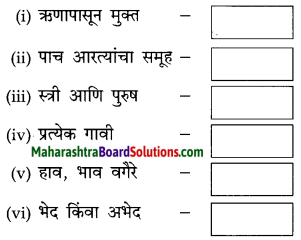
उत्तर :

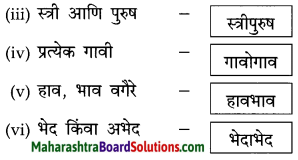
प्रश्न 2.
तक्ता पूर्ण करा : (मार्च ‘१९)

उत्तर :

![]()
२. अलंकार :
प्रश्न 1.
पुढील उदाहरण वाचून तक्ता पूर्ण करा :
देवाहुनही महान आहे माझी आई

उत्तर :

३. शब्दसिद्धी :
प्रश्न 1.
‘बे’ हा उपसर्ग लागून तयार होणारे चार शब्द लिहा.
उत्तर :
- बेबंद
- बेजबाबदार
- बेहिशेब
- बेबनाव.
प्रश्न 2.
पुढील शब्दांना ‘अनीय’ हा प्रत्यय लावून शब्द तयार करा :
(i) श्रवण – ……………
उत्तर :
श्रवणीय
(ii) वाचन – ………….
उत्तर :
वाचनीय.
प्रश्न 4.
दोन अभ्यस्त शब्द लिहा.
उत्तर :
- लालेलाल
- गारेगार.
४. सामान्यरूप :
प्रश्न 1.
पुढील तक्ता पूर्ण करा :
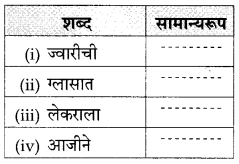
उत्तर :
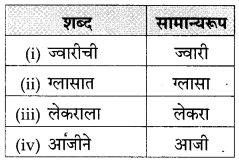
५. वाक्प्रचार :
(१) कंसातील वाक्प्रचारांचा त्या खालील वाक्यांत योग्य ठिकाणी वापर करून वाक्ये पुन्हा लिहा :
(शाबूत असणे, कानोसा घेणे, कडुसं पडणे, शहानिशा होणे, गुण्यागोविंदाने नांदणे)
प्रश्न 1.
शाळेतून घरी आलो की बाबा नेहमी अभ्यासाची चौकशी करायचे.
उत्तर :
शाळेतून घरी आलो की बाबा नेहमी अभ्यासाची शहानिशा करायचे.
प्रश्न 2.
मावळतीला सूर्य गेला नि अंधार पडला.
उत्तर :
मावळतीला सूर्य गेला नि कडुसं पडले.
प्रश्न 3.
घरातील दोन्ही जावा अगदी खेळीमेळीने राहत.
उत्तर :
घरातील दोन्ही जावा अगदी गुण्यागोविंदाने नांदत होत्या.
प्रश्न 4.
पाऊस पडणार आहे की नाही, याचा आमचा मोती कान टवकारून अंदाज घेतो.
उत्तर :
पाऊस पडणार आहे की नाही, याचा आमचा मोती कान टवकारून कानोसा घेतो.
![]()
(२) पुढील वाक्यांतील वाक्प्रचार शोधून अधोरेखित करा :
प्रश्न 1.
सहलीच्या वेळी शिस्तभंग होऊ नये याकडे शिक्षकांचा कटाक्ष असतो.
उत्तर :
सहलीच्या वेळी शिस्तभंग होऊ नये याकडे शिक्षकांचा कटाक्ष असतो.
प्रश्न 2.
दोन व्यक्तींतील संवादाचा तिसऱ्या व्यक्तीने कानोसा घेणे अयोग्यच.
उत्तर :
दोन व्यक्तींतील संवादाचा तिसऱ्या व्यक्तीने कानोसा घेणे अयोग्यच.
प्रश्न 3.
कारण नसताना हुकमत गाजवणाऱ्या व्यक्ती इतरांच्या नजरेतून उतरतात.
उत्तर :
कारण नसताना हुकमत गाजवणाऱ्या व्यक्ती इतरांच्या नजरेतून उतरतात.
![]()
आ. (भाषिक घटकांवर आधारित कृतीः
१. शब्दसंपत्ती :
प्रश्न 1.
विरुद्धार्थी शब्दांच्या योग्य जोड्या जुळवा :
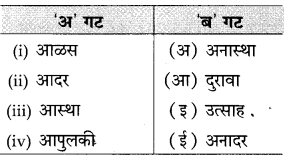
उत्तरे :
(i) आळस × उत्साह
(ii) आदर × अनादर
(iii) आस्था × अनास्था
(iv) आपुलकी × दुरावा
आजी : कुटुंबाचं आगळ Summary in Marathi
पाठाचा आशय या कथानकातील आजी खमकी आहे. तिच्या देहाची ठेवण, तिचे दिसणे, तिचा पेहराव इत्यादी बाबींमध्ये तिचा खमकेपणा दिसून येतो.
‘आगळ ‘मधील नायकाच्या घरी एक गाय होती. ती वरवर्षी व्यायची. त्यामुळे घरामध्ये दुधाची खूप रेलचेल होती. मुलांना भरपूर दुध प्यायला मिळे. आजीला चार सुना होत्या. आजीचा दरारा असल्यामुळे मुलांना खायलाप्यायला देताना सुना आपपरभाव करू शकत नव्हत्या. कामचुकारपणा करू शकत नव्हत्या. आपली कामे दुसरीवर टाकू शकत नव्हत्या. सर्व कामे प्रत्येकीला करावी लागत. या वातावरणामुळे कोणावर अन्याय होत नव्हता. कोणालाही तक्रार करायला वावच नसे. आजीमुळे प्रत्येकीला किंवा प्रत्येकाला भरभक्कम संरक्षण मिळाले होते. हे संरक्षण आगळइतकेच भक्कम होते.
दुपारच्या वेळी मुलांचे बैठे खेळ किंवा क्वचितप्रसंगी मैदानी खेळ खेळले जात. अशा प्रकारे मुलांचे बालपण तर निसर्गामध्ये सहजगत्या घडत होते. या सगळ्याला आजीच्या मायेच्या सावलीचा आधार होता.
दुपारपर्यंतची कामे आटोपल्यावर थोडीशी विश्रांती घेऊन आजी ढाळजेत येऊन बसायची. गल्लीतल्या बायका जमायच्या. निवडटिपण असली कामे करता करता गप्पा होत. गावभरच्या बातम्या कळत. आजीच्या समोरच बातम्यांची शहानिशा होई. ही ढाळज म्हणजे एक प्रकारे गावाचे वर्तमानपत्रच होती. रात्री आठ वाजता वाड्याचा दरवाजा बंद होई आणि आगळ बसवली जाई. आगळ बसवली की संरक्षणाची हमी मिळे.
आजी : कुटुंबाचं आगळ शब्दार्थ
- रापणे – त्वचेवर काळपटलेली छटा येणे.
- गोंदण – विशिष्ट प्रकारच्या सुईने त्वचेवर टोचून टोचून नक्षी काढणे.
- गावरान – गावठी. वेत – वासराला जन्म देणे.
- धार काढणे – गाई-म्हशीचे दूध काढणे.
- चरवी – दूध काढण्याचे भांडे.
- धारोष्ण – उष्णपणा निवला नाही असे ताजे दूध.
- सरपण – इंधन (विशेषतः लाकडांचे).
- ढाळज – मोठा वाडा वगैरेंसारख्या घराच्या मुख्य दरवाजाजवळची आतल्या बाजूची
- जागा, पडवी, वाकळ – गोधडी.
- शहानिशा – खातरजमा,
- कडुसं – काळोख होण्याची वेळ,
- आगळ – अडसर (येथे अर्थ-भक्कम आधार.).
- देवळी – भिंतीतला कोनाडा.
- चिंचोके – चिंचेच्या बिया.
- गजगे – सागरगोटे,
- जिबल्या – अर्धा कापलेला जोड्यांचा तळ.
- मुटके – हातपाय पोटाशी आवळून घेऊन आजूबाजूला खूप पाणी उडेल अशा रितीने पाण्यात मारलेली उडी.
आजी : कुटुंबाचं आगळ वाक्प्रचार व त्यांचे अर्थ
- हुकूमत गाजवणे : अधिकार गाजवणे.
- हातात काठी येणे : म्हातारपण येणे; तोल सांभाळता न येणे.
- गुण्यागोविंदाने नांदणे : समंजसपणे व आनंदाने राहणे.
- धार काढणे : गायी-म्हशीचे दूध काढणे.
- कटाक्ष असणे : खास लक्ष देणे.
- धान्य निवडणे : धान्यातले गोटे इत्यादी वेचून बाहेर काढणे.
- हुक्की येणे : लहर येणे.
Marathi Kumarbharti Std 10 Digest Pdf भाग-१
